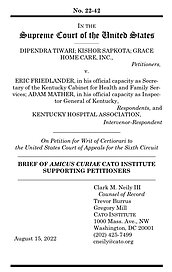Learn more about Cato’s Amicus Briefs Program.
Dipendra Tiwari and Kishor Sapkota want to establish a home healthcare company, named Grace Home Care, in Louisville, Kentucky. As Nepalese immigrants, they believe that they can uniquely provide comfort to the Nepali-speaking patients in the area.
But Kentucky will not let Tiwari and Sapkota run this business. That isn’t because they lack sufficient experience in the industry or because they would fail to do anything necessary to supply services safely and competently. Instead, Kentucky has apparently determined that there is no “need” for more home healthcare businesses in the area. These laws, which are called certificate-of-need (CON) laws, are quite common throughout the country, especially in healthcare, but also oddly in businesses like moving companies. Through various formulas, states purportedly determine whether another business is “needed” or whether there is sufficient competition.
It seems like common sense that CON laws like Kentucky’s are highly susceptible to being used primarily for protecting incumbent businesses. History and empirical studies confirm that intuition. Since the late 1980s, nearly all economic scholarship has questioned the value of CON laws and showed their tendency towards incumbency protection. And yet, CON laws—like many barriers to occupational freedom—persist.
Tiwari and Sapkota challenged Kentucky’s CON law in federal court as a violation of their right to earn a living. Unfortunately, the U.S. Supreme Court’s precedents generally require courts to uphold “economic regulations” if the court can think of any justification, even when there is no evidence to support that rationale. As a result, both the district court and the Sixth Circuit rejected Tiwari and Sapkota’s claim.
Now on petition to the Supreme Court, Cato has filed an amicus brief urging the Court to hear Tiwari and Sapkota’s case and reverse the Sixth Circuit. We argue that deprivations of economic liberty require meaningful judicial scrutiny that actively engages with the facts of the case without putting a finger on the scales in favor of the government.
The right to pursue a chosen occupation is as personal and important a right as any other. Most of us will spend much our daily lives at work, and, for many, work is a form of self-expression. And the right to work has been protected in Anglo-American law for centuries. The Privileges or Immunities Clause of the Fourteenth Amendment was partially adopted to protect this right. It’s time for the Supreme Court to recognize—really, to rediscover—the importance of the right to earn a living.
Meaningful scrutiny is important when incumbent business can use CON laws to keep out competitors. By scrutinizing a law’s proffered justifications, courts will likely find that the justifications are just pretextual smokescreens for illegitimate anti‐competitive behavior. Occupational licensing laws generally, and CON laws particularly, are prime examples of laws where the risk of them being implemented for purely protectionist reasons is particularly acute and the democratic process is unusually incapable of fixing the problem.
The Supreme Court should grant Tiwari and Sapkota’s petition. For too long the Supreme Court has allowed irrational laws burdening the right to earn a living to escape meaningful judicial scrutiny. This case is a prime opportunity to change course.

This work is licensed under a Creative Commons Attribution-NonCommercial-ShareAlike 4.0 International License.


